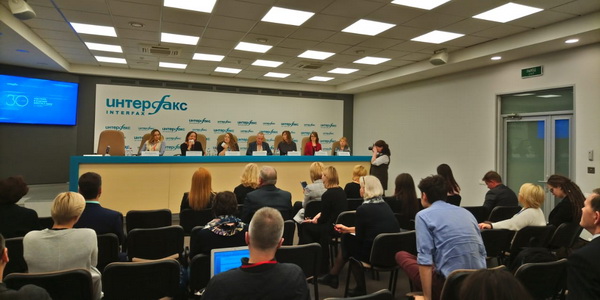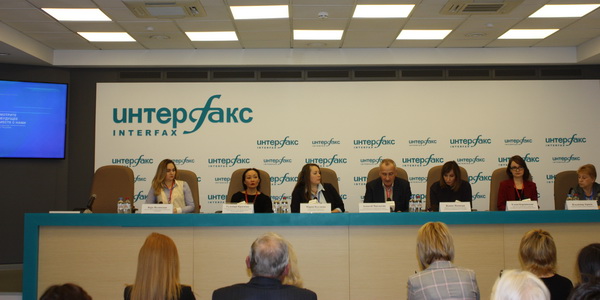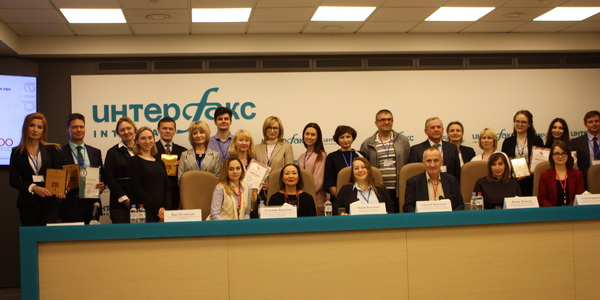“MEDIAactivity of Russian universities” and “TOP-50 MEDIAactive Rectors of Russia” announced at Interfax

On Tuesday, November 12, press conference on the MEDIAStrategy of Leadership in Education: Corporate, National, International Levels was held at the office of the Interfax news agency (1st Tverskaya-Yamskaya St., 2, building 1).
The press conference was devoted to the results of a large-scale study project of the information activities of Russian universities “MEDIAactivity of Russian universities” and “TOP-50 MEDIAactive Rectors of Russia”.
Experts and participants of the press conference noted that the main barriers that have a serious impact on the effectiveness of information work remain:
- misunderstanding of requests of target audiences (stakeholders);
- internal communication gap between the key structural units of the university;
- inability to work with new channels and tools;
- insufficient qualification of specialists / lack of specialists of university information units;
- lack of resources to fully ensure the processes of information transparency and the activities of the university press services themselves;
- unconstructive leadership position.
In addition to information interaction with audiences, the university’s website is becoming the main recruiting tool for foreign students. However, there are still a lot of comments on the content and structure of foreign-language versions of websites. Thus, Elena Karpinskaya , Deputy Program Director of the Russian Council on Foreign Affairs, noted that “only 8.9% (versus 9.23% in 2018) of the Internet portals of the analyzed Russian universities are more than 67% full.”
According to Gulnara Krasnova, Chief Researcher at the Competence Center for International Services of Educational Organizations of the RANEPA, Russian universities almost do not use the potential of alternative digital recruiting channels, in particular, English-language accounts in the social network segment are not developed, and foreign-language Wikipedia is not used.
Zhanna Pampura, Business Development Director of MIG INTERFAX, spoke about the importance of established communications between universities and the media .
The analyst at the SKOLKOVO Education Transformation Center, Vera Volyanskaya, drew attention to the need for an open public dialogue on the changes in university management. “Universities publicly talk about their educational or, more rarely, research processes, while almost nothing is heard about managerial and strategic moments in development,” she said.
Within the framework of the press conference, the winners of the All-Russian contest “PRESS Service of Russian Universities - 2019”, the finalists of the “MEDIAactive Universities of the Russian Federation-2019” competition, and the finalists of the international stage "Informationally Transparent HEI. International level", as well as the announcement of the list of finalists “TOP-50 MEDIAactive Rectors of Russia - 2019 ”.
The project organizer, director of Accreditation in Education, Ekaterina Shigapova presented the following statistics:
In 2019 more than 400 university press services from 24 Russian regions took part in the open competition "University Press Service". 78 press services were awarded as laureates in eight nominations. The press service of the Russian Presidential Academy of National Economy and Public Administration, the National Research Nuclear University MEPhI and Tomsk State University were awarded with a separate special nomination from the project partner - MIG "INTERFAX". 31 universities took part in the project “MEDIAactivity of Universities of the Russian Federation-2019”. Evaluation of their information activities was carried out in five areas: “Event-driven activity”, “Work with the media”, “Information support of the Rector’s activities”, “Content and site structure”, “Social networks”. As a result, the expert commission recognized 12 universities as winners.
Participants of the international stage "Informationally Transparent HEI. International level", within the framework of which a group of Russian and foreign experts evaluated the state of the English-language sites of the participants.
Participants and finalists of the project received targeted comments and recommendations of the expert group.

